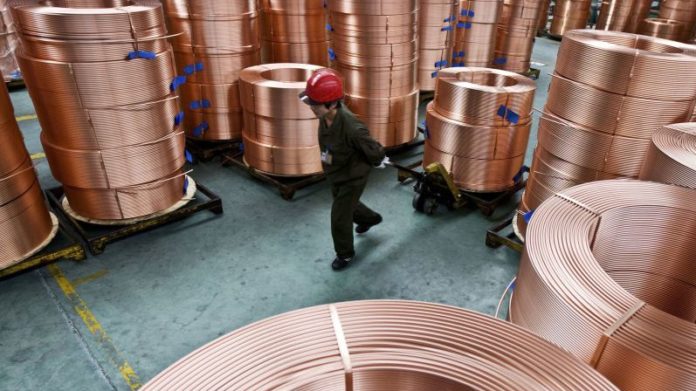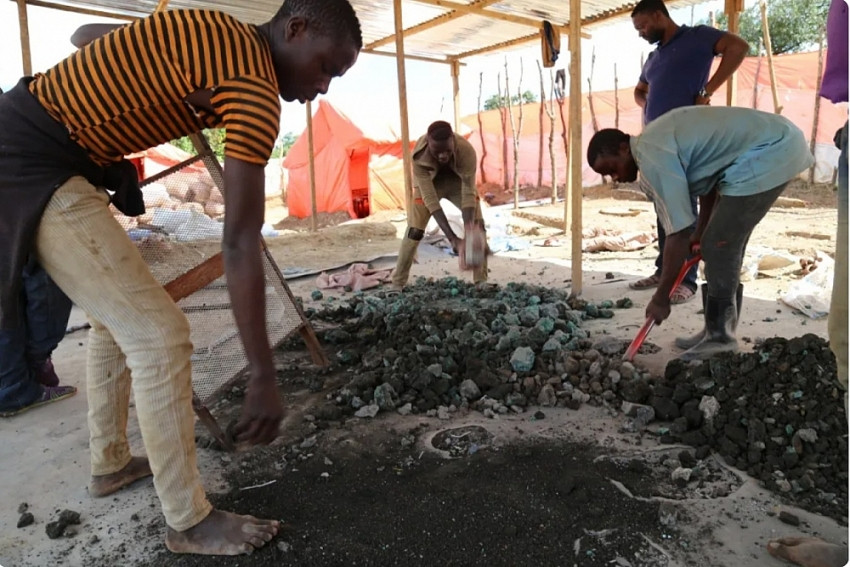A bowl of pho costs around 50,000 VND. However, this amount of money could buy a whole “treasure”. This is absolutely true, and a Chinese company has just accomplished this “extraordinary” feat.
“This treasure” is a Lubambe copper mine in Zambia, Africa.
As China asserts its leadership in the global green energy transition, many Chinese companies are increasingly acquiring large copper, cobalt, and lithium projects in Africa, which dominates the important mineral market. The unique deal at a “bargain” price below is a testament to this trend.
According to Reuters, the Chinese company JCHX is about to finalize a deal to purchase up to 80% of the Lubambe copper mine. The agreement is currently awaiting approval from the Zambian government. The Lubambe copper mine is currently held by the Australian-based investment company EMR Capital.
Why did the Chinese company buy the copper mine for the price of a bowl of pho?

A large copper mine in Africa was bought by a Chinese company for just $2. Photo: Miningmx
After the deal, the Chinese company holds 80% of the Lubambe copper mine, while the Zambian government (through ZCCM Investments Holdings) will hold the remaining 20% of the mine located in Chililabombwe, a town in Zambia’s Copperbelt province, near the border with the Democratic Republic of the Congo.
However, the most surprising fact is that the cost to acquire the Lubambe copper mine was only $2 (about 50,000 VND). This information was announced by JCHX Mining earlier this year. Accordingly, the company will establish a project company to buy shares for $1 from EMR Capital and pay an additional $1 to purchase the company’s debt of $857 million.
According to the SCMP, Zambia is currently the second-largest copper-producing country in Africa, after the Congo. In addition, Zambia also has abundant resources of gold, gemstones, nickel ore, iron bars, iron alloys, cobalt… This has attracted many Chinese companies in recent years.
In fact, JCHX Mining has been operating in Zambia for more than 20 years, mainly in the fields of resource investment and contract mining. JHCX is also a mining services provider for the Lubambe copper mine in Zambia since 2017.
According to Associate Professor Lauren Johnston from the University of Sydney’s China Studies Center, increasing tensions in the renewable energy supply chain between China and Western countries are threatening and increasing restrictions and monitoring of acquisitions in the renewable energy mineral supply chain.
In addition, according to Ms. Johnson, with the importance of copper to new energy fields in general, this can help explain the interest of JCHX Mining in investing in Zambia’s Lubambe mine and the reason for EMR Capital’s sale of 80% of its shares.
In fact, the Zambia deal comes just a few months after Chinese company MMG (backed by state-owned mining conglomerate China Minmetals Corporation) bought the Khoemacau copper mine in Botswana for about $1.9 billion from Cuprous Capital. A private company has been producing copper in Khoemacau since 2021.
According to MMG, the agreement is in line with the company’s strategy to build a portfolio of high-quality mines to provide the most important minerals for a carbon-free world. According to the SCMP, the Khoemacau mine has copper reserves of about 6 million tons and has mining rights over an area of more than 4,000 km2.
The “high-level” strategy of many Chinese companies

Workers sorting minerals in the Democratic Republic of the Congo. This is one of the places where Chinese companies have heavily invested in mining. Photo: AFP
In addition to the new assets in Zambia and Botswana, Chinese companies are also heavily investing in mining activities in the Democratic Republic of the Congo, the world’s largest cobalt producer and a major supplier to the global market.
Another African country, Zimbabwe, has emerged as a major supplier of lithium, a metal essential for the production of lithium-ion batteries. On the other hand, China has invested in several iron ore projects in Guinea, Cameroon, Siera Leone, and Algeria.
A recent study by the consulting organization Carnegie Endowment for International Peace (headquartered in Washington, DC, USA) shows that Africa’s mineral exports to China are increasing rapidly, with a value of nearly $50 billion in 2021, up from $15 billion in 2010.
The report also points out that Chinese investments are not limited to mineral extraction but also include refining and processing them in Africa.
According to Ms. Zainab Usman, Director of the Africa Program at the Carnegie Endowment Foundation, another important factor driving the participation of many Chinese companies in Africa’s mining industry is the demand for minerals and metals needed by the industries of the country’s billion people, especially those related to renewable energy and electric vehicles.
In addition, Mr. Christian-Geraud Neema, Africa Editor at China Global South Project and a non-resident scholar at the Carnegie Endowment, opined that geopolitics is still considered an important factor behind China’s acquisition of mineral mines. The minerals acquired are intended for use in economic, industrial, and defense fields. They are all important or strategic minerals for China. This can be seen when looking at the profile of all these deals.
Meanwhile, according to Mr. Mark Bohlund, a senior credit analyst at REDD Intelligence, China has been driving the demand for copper for most of the past two decades. This is mainly due to the demand for copper accessories in new real estate development projects.
According to the expert, high ore grades and relatively untapped reserves make Africa an interesting prospect for copper investment. Moreover, Chinese companies can more easily acquire shares due to the weaker position of established companies.
Reference: SCMP, Reuters, Mining
Earn money fast like Dang Le Nguyen Vu: Trung Nguyen Legend in Shanghai opens in less than a year and already profitable?
Being open for just 9 months, Mr. Dang Le Nguyen Vu revealed in an interview that Trung Nguyen Legend in Shanghai “is profitable already, despite the heavy investment!”

















